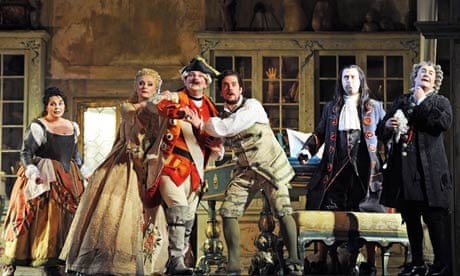Spontaneous laughter, the sort that spreads through an auditorium with joyful infection, happens infrequently at the opera. We are more likely to snigger when a death scene goes wrong, or weep in satisfaction when it triumphs. The comic spirit can remain elusive. How familiar those occasions, whether in Rossini, Donizetti or Léhar, when the slapstick grows slappier and stickier and our expressions freeze to a scowl.
A few lone mouths may have turned down at the return of Rossini's The Barber of Seville to English National Opera. For most it provoked smiles. Jonathan Miller's classic production, in a 25th anniversary revival by Peter Relton, has always looked traditional in Tanya McCallin's designs: powdered wigs, breeches, frock coats, and a set busy with glass-fronted cupboards and dust-attracting objets. This staging now has a patina of its own, suggesting another era of opera production – the mid-1980s, with its love of flounce and authenticity – as well as the 18th century of Beaumarchais's original, subversive Figaro plays.
The wit bursts out of the music, written at top speed and full of self-borrowings. Rossini's "mad" choruses, particularly in this opera, reflect the folly of life with dazzling rationality and tight musical control. "Our poor, bewildered brains, stunned and confused, are reduced to insanity", sang the ensemble, or words to that effect, at the end of Act I. This was on Monday night. That very moment, the Italian people were discovering, post-election, that their country was in thrall to a clown.
The text, especially in Anthony and Amanda Holden's clever rhyming translation, is sharp and acidic. There may be only two women in this opera – Rosina, who has become the Countess in Mozart's Marriage of Figaro, and the housekeeper Berta – but they have handbags full of shrewish intelligence. Men, beware. Andrew Shore gives a masterly, pompous performance as the crusty, deluded Doctor Bartolo, his enunciation a model of clarity. An iota more horseplay and the show would deflate: he is wise enough to know that.
As Rosina, Lucy Crowe is glorious: her light, nimble coloratura immaculate, her eyebrows speaking with a sign language all of their own. Benedict Nelson, a stylish singer of quiet authority, never overplays Figaro, which comes as welcome relief in this raffish, pantomimic staging. Andrew Kennedy, as Count Almaviva, was a little dry on first night but this versatile tenor will overcome any initial hesitation.
He is comic in his disguise as drunken soldier and mustard-hosed music teacher but, like Shore, knows to go no further. Yellow stockings are not the biggest turn on, especially when your lover has only so far seen you through a window. It is vital not to turn this perfectly aerated romance into farce. Katherine Broderick, arch and ardent as Berta, and David Soar as the deep-throat, deep-voiced hypocrite Don Basilio, provided classy cameos. Jaime Martín, making his ENO conducting debut (having at one time played in the orchestra's flute section), chose crisp tempi, buoyant and never rushed. There are plenty of seats. Give it a go.
A concert by a string quartet of music by Bartók, Janácek and Berg would appear a polar opposite to the fizz of staged Rossini. In most respects it is. Where they coincide, however, is in a shared sense of theatre. The Emerson Quartet have played together since 1979. All except, for obvious reasons of impracticality, the cellist stand to perform. They respond to each other instinctively and freely, laying bare the conversational nature of the music, each in constant dialogue with the other three, listening, watching, participating or staying silent.
The drama is real and intense. Perhaps above all other musical forms, chamber music rewards live encounter in the concert hall. To see, as well as hear, how the music works doubles the enjoyment. It's as if the score were laid out and animated in front of you. As part of the Southbank's The Rest is Noise festival, the Emersons chose three works written within two years of each other, opening with Bartók's short, caustic String Quartet No 3 (1927). Here, robust, jutting Hungarian folk rhythms are spun together with desolate, unyielding melody. One influence is said to have been Bartók's encounter, in the summer of 1927, with Berg's Lyric Suite.
After Janácek's String Quartet No 2, "Intimate Letters", given a searing performance properly dominated throughout by the potent viola playing of Lawrence Dutton, they finished with the Berg. Written against a backdrop of forbidden love – loosely the theme of the concert – the music explores all varieties of string technique, most obviously mutes, harmonics, pizzicato, to create a many-layered ghost-world of sound.
The Emersons have long been familiar faces to UK chamber music fans. All is about to change. The British cellist Paul Watkins will take the place of David Finckel, who is off to fulfil musical callings beyond the world of the string quartet. This was his last concert with the ensemble in this country. As an encore, the group played some Copland. Just as the Berg ends with a quietly retreating viola, so here a similar if briefer farewell occurs with the cello. It was not inappropriate, to use this week's favourite word, for this charismatic player to have the last musical word of the evening.

Comments (…)
Sign in or create your Guardian account to join the discussion